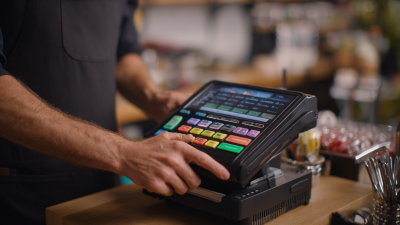 In the fast-evolving landscape of modern retail, precision and efficiency are paramount, making tools like POS rolls indispensable. Point of Sale (POS) systems have continued to streamline transactions, with a report from Grand View Research noting that the global POS terminal market is expected to reach $98.73 billion by 2027, growing at a CAGR of 10.2%. Amidst this growth, the critical yet often overlooked component—POS rolls—play a vital role in supporting operational efficiency and enhancing customer experience. These thermal paper rolls are essential for printing receipts, invoices, and other critical transaction documents, diligently ensuring that retail businesses maintain precise records and transparency. With the transition to digital payment methods also increasing, understanding the significance of POS rolls becomes essential for retailers aiming to optimize their processes and adapt to an ever-competitive environment.
In the fast-evolving landscape of modern retail, precision and efficiency are paramount, making tools like POS rolls indispensable. Point of Sale (POS) systems have continued to streamline transactions, with a report from Grand View Research noting that the global POS terminal market is expected to reach $98.73 billion by 2027, growing at a CAGR of 10.2%. Amidst this growth, the critical yet often overlooked component—POS rolls—play a vital role in supporting operational efficiency and enhancing customer experience. These thermal paper rolls are essential for printing receipts, invoices, and other critical transaction documents, diligently ensuring that retail businesses maintain precise records and transparency. With the transition to digital payment methods also increasing, understanding the significance of POS rolls becomes essential for retailers aiming to optimize their processes and adapt to an ever-competitive environment.
Point of Sale (POS) rolls are critical components in the retail landscape, serving as the backbone for transaction documentation. They are used in POS systems to print receipts, invoices, and other important transaction records, ensuring that both businesses and customers have a clear and tangible reminder of purchases made. The consistent supply of these rolls is vital for maintaining smooth operations, and their importance cannot be overstated, particularly as businesses increasingly move towards enhancing customer experience and ensuring efficient financial management.
Moreover, the importance of POS rolls extends beyond the mere functionality of transaction recording. In an era where sustainability is becoming paramount, businesses are under pressure to adopt eco-friendly practices. Recent developments in the logistics industry showcase this shift; partnerships focusing on environmentally friendly initiatives indicate that retailers can embrace greener solutions in all facets of their operations. By incorporating sustainable materials into POS rolls and reducing waste, businesses can align themselves with the growing consumer demand for responsible retail practices, thereby reinforcing their brand integrity while enhancing operational efficiency.
In the rapidly evolving retail landscape, the customer experience plays a pivotal role in business success. Point of Sale (POS) rolls are crucial in enhancing this experience, as they ensure seamless transactions and provide essential components for effective customer interaction. High-quality POS rolls not only facilitate quick and efficient checkouts but also contribute to creating a positive atmosphere in stores by minimizing wait times.
Tip 1: Invest in thermal POS rolls to enhance receipt clarity. Customers appreciate clear and legible receipts that contain information about their purchases, return policies, and contact details. High-quality rolls prevent fading and maintain readability, reinforcing trust between the business and its clientele.
Tip 2: Consider customizing your POS rolls with logos or promotional messages. This small touch not only elevates your brand's visibility but also creates an opportunity for cross-selling or upselling. A well-designed receipt can engage customers even after they leave the store, keeping your brand top-of-mind for future visits.
Ultimately, integrating efficient POS rolls into retail operations can significantly improve customer satisfaction and loyalty, making them an indispensable tool in modern retail business strategies.
In today’s competitive retail landscape, effective inventory management and sales tracking are paramount for success. Point of Sale (POS) rolls play a crucial role in streamlining these processes. By providing real-time data on sales trends and inventory levels, businesses can make informed decisions that enhance operational efficiency and customer satisfaction. For instance, the global market for inventory tags is projected to grow from $5.78 billion in 2024 to $8.49 billion by 2032, reflecting a compound annual growth rate of 4.9%. This growth underscores the importance of efficient inventory management systems that can adapt to market changes.
Tips for Optimizing Inventory Management:

Leveraging modern POS rolls not only enhances sales tracking but also supports better inventory control, which is essential as businesses increasingly rely on streamlined operations to meet consumer expectations. As e-commerce continues to grow, adopting a robust POS system will be vital for staying ahead in the market.
When selecting the right POS rolls for retail businesses, several critical factors must be considered to ensure optimal performance and customer satisfaction. First, the type of printer being used is crucial. According to a report by Smithers Pira, thermal printers, which are commonly used in retail environments, require specific paper types to function effectively. Retailers should assess whether they are using direct thermal or thermal transfer printers, as each type dictates a different kind of POS roll.

Additionally, the width and length of the POS rolls are vital considerations. A study by the National Retail Federation highlights that improper roll sizes can lead to increased wastage and inefficiencies in printing. Retailers must choose rolls that fit their printers while also accommodating their transaction volume. Furthermore, choosing rolls with high-quality materials can enhance durability and print clarity, reducing the likelihood of errors at checkout. Ensuring that the chosen rolls are also environmentally friendly can appeal to eco-conscious consumers, aligning with the growing trend towards sustainable retail practices.
In the fast-paced world of modern retail, efficient point of sale (POS) systems are vital for ensuring smooth transactions and enhanced customer experiences. To implement and maintain POS rolls effectively, retailers should adopt a few best practices that not only streamline operations but also contribute to overall customer satisfaction.
First and foremost, ensure that you regularly monitor the inventory of POS rolls. Running out of these critical supplies can lead to transaction delays, ultimately frustrating your customers. Schedule routine checks, and consider using inventory management software to automate this process, which can alert you when stock levels drop below a certain threshold.
Another key practice involves training staff on the proper use of POS equipment and the importance of maintaining the rolls. Create a comprehensive training program that emphasizes troubleshooting common issues, such as roll jams or printer errors. Encouraging staff to perform regular maintenance checks can prevent potential malfunctions, ensuring that transactions run smoothly and efficiently.
Lastly, always stay informed about the latest advancements in POS technology and the types of rolls available. Opt for high-quality, compatible POS rolls that enhance the performance of your system. By keeping up with industry trends, you can make informed purchasing decisions that will benefit your retail business in the long run.
| Dimension | Importance | Best Practices |
|---|---|---|
| Print Quality | Ensures clear and legible receipts | Use high-quality thermal paper |
| Paper Size | Compatibility with POS systems | Select the right size for your POS printer |
| Roll Length | Reduces frequency of changes | Choose longer rolls for busy stores |
| Storage Conditions | Prevents damage and degradation | Store in a cool, dry place |
| Cost Efficiency | Helps manage overall operational costs | Buy in bulk and assess quantity needed |






